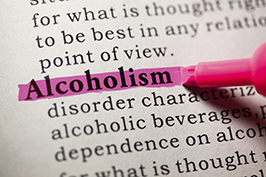Alcoholism and Alcohol Abuse

Posted on January 30, 2015
Alcoholism and Alcohol Abuse
Alcoholism and alcohol abuse are two types of problem drinking.
Alcoholism is when your drinking causes serious problems in your life, yet you keep drinking. You also may have a physical dependence on alcohol. You need more and more alcohol to feel drunk. Stopping suddenly may cause withdrawal symptoms.
Alcohol abuse is when your drinking leads to problems, but you are not physically dependent on alcohol. These problems may occur:
• At work, school, or home
• In your personal relationships
• With the law
• From using alcohol in dangerous situations, such as drinking and driving
Drinking too much alcohol can put you at risk for alcohol problems. You are more at risk for alcoholism if:
• You are a man who has 15 or more drinks a week
• You are a woman who has 12 or more drinks a week
• You have five or more drinks at a time at least once a week
One drink is defined as a 12-ounce bottle of beer, a 5-ounce glass of wine, or a 1 1/2-ounce shot of liquor.
If you have a parent with alcoholism, you are more at risk for alcohol problems.
Alcohol abuse is on the rise. In the U.S., 3 out of 10 people drink at a level that puts them at risk for alcoholism.
If you are concerned about your drinking, it may help to take a careful look at your alcohol use.
Symptoms
If you have a drinking problem, you may:
• Continue to drink, even when your health, work, or family are being harmed
• Drink alone
• Become stirred up, excited, or tense when drinking
• Become hostile when asked about your drinking
• Make excuses to drink
• Miss work or school, or don’t perform as well because of drinking
• Stop taking part in activities you enjoy because of alcohol
• Need to use alcohol on most days to get through the day
• Don’t eat a lot or eat poorly
• Not care about how you dress or if you are clean
• Try to hide alcohol use
• Shake in the morning or after periods when you have not had a drink
Treatment
Many people with an alcohol problem need to completely stop using alcohol. This is called abstinence. Having strong social and family support can help make it easier to quit drinking.
Some people are able to just cut back on their drinking. So even if you don’t give up alcohol altogether, you may be able to drink less. This can improve your health and relationships with others. It can also help you perform better at work or school.
However, many people who drink too much find they can’t just cut back. Abstinence may be the only way to manage a drinking problem.
Support Groups help many people who are dealing with alcoholism.
ALCOHOLICS ANONYMOUS (AA) – Alcoholics Anonymous is a self-help group of recovering alcoholics.
AL-ANON – Family members of a person with an alcohol problem often benefit from talking with others.
When to Contact a Medical Professional
Talk with your primary care physician if you or someone you know may have an alcohol problem.
Comments are currently closed.








